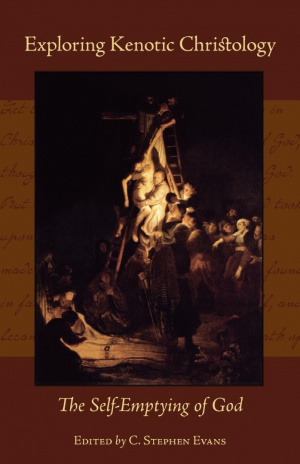"Exploring Kenotic Christology" ed. by C. Stephen Evans
ed: C. Stephen Evans. Exploring Kenotic Christology: The Self-Emptying of God . Regent College Publising, 2009. 360 pgs.
. Regent College Publising, 2009. 360 pgs.
Full disclosure: This book was provided by Regent College Publising for review.
"Your attitude should be the same as that of Christ Jesus:
Who, being in very nature God,
did not consider equality with God something to be grasped,
but made himself nothing,
taking the very nature of a servant,
being made in human likeness.
And being found in appearance as a man,
he humbled himself and became obedient to death--
even death on a cross!
Therefore God exalted him to the highest place
and gave him the name that is above every name,
that at the name of Jesus every knee should bow,
in heaven and on earth and under the earth,
and every tongue confess that Jesus Christ is Lord,
to the glory of God the Father."
- Philippians 2:5-11
Have you ever wondered what this poem/hymn means? What does it mean that God made himself nothing? What is this emptying, this demotion? Is it merely poetic language, or does it reflect something much more important? And how, within all of this, do you understand the incarnation? How can God, omnipresent, omnipotent, omniscient, become man who is, seemingly by definition, none of these things? Did God give something up to become man? If so, how? And is God still God if he gives up some of His attributes, or do we find ourselves face-to-face with that oh so nasty of theological positions: a paradox?
These questions, and many more, are at the heart of Kenotic Christology and, thus, at the heart of this book. Exploring Kenotic Christology is a theological volume which does exactly what it declares in the title. Through a collection of thirteen essays by various authors this book takes on almost the full raft of issues surrounding Kenotic Christology.
Kenotic Christology is the idea, or theory, that in becoming human Christ, the second person of the Trinity, suspended some of His attributes as God. The motivating factor behind this is texts such as Phil. 2, but also the witness of the gospels to Jesus as a person who suffered, grew in maturity, wept, etc. One of the many problems that arises is that this seems to challenge the classical idea of God as immutable and impassable. The twelve authors of this book seek, in various ways, to grapple with these things.
However, in being by twelve different authors this book is also very difficult to summarize. While Kenotic Christology may be a broadly recognizable theological category it seems inevitable that each individual kenoticist is unique in their theology. Instead of trying to summarize let me merely offer some comments on what you will find: The essays range from focused biblical considerations of how the scriptures witness to Kenotic Christology to in depth explorations of the philosophical quandaries offered by the same, from defenses of Kenotic Christology as orthodox to essays questioning whether or not this whole enterprise is founded on a mistake. Yes, you will even find criticisms of Kenotic Christology within these pages. If that doesn't communicate to you the quality of this collection, then I don't know what will.
If you haven't picked up on this fact yet, let me make it crystal clear: This is a great book. Incarnation theology is an incredibly important part of Christian belief, one which we often spend too little time on. Here is a serious, well written, well edited, volume of impressive essays remedying that situation. It is, as you might expect, a more difficult read at times; such is the nature of the topic. It is also, as you may not have expected, more than worth it.
Conclusion: 5 Stars. Conditionally Recommended. I have to say conditional simply because of the difficulty of this book. Yes, it will be a hard read. Yes, you may want to work you way up to this book by starting out with shorter, simpler, books on the incarnation. However, you will not be disappointed if you can get to reading this book.

Comments